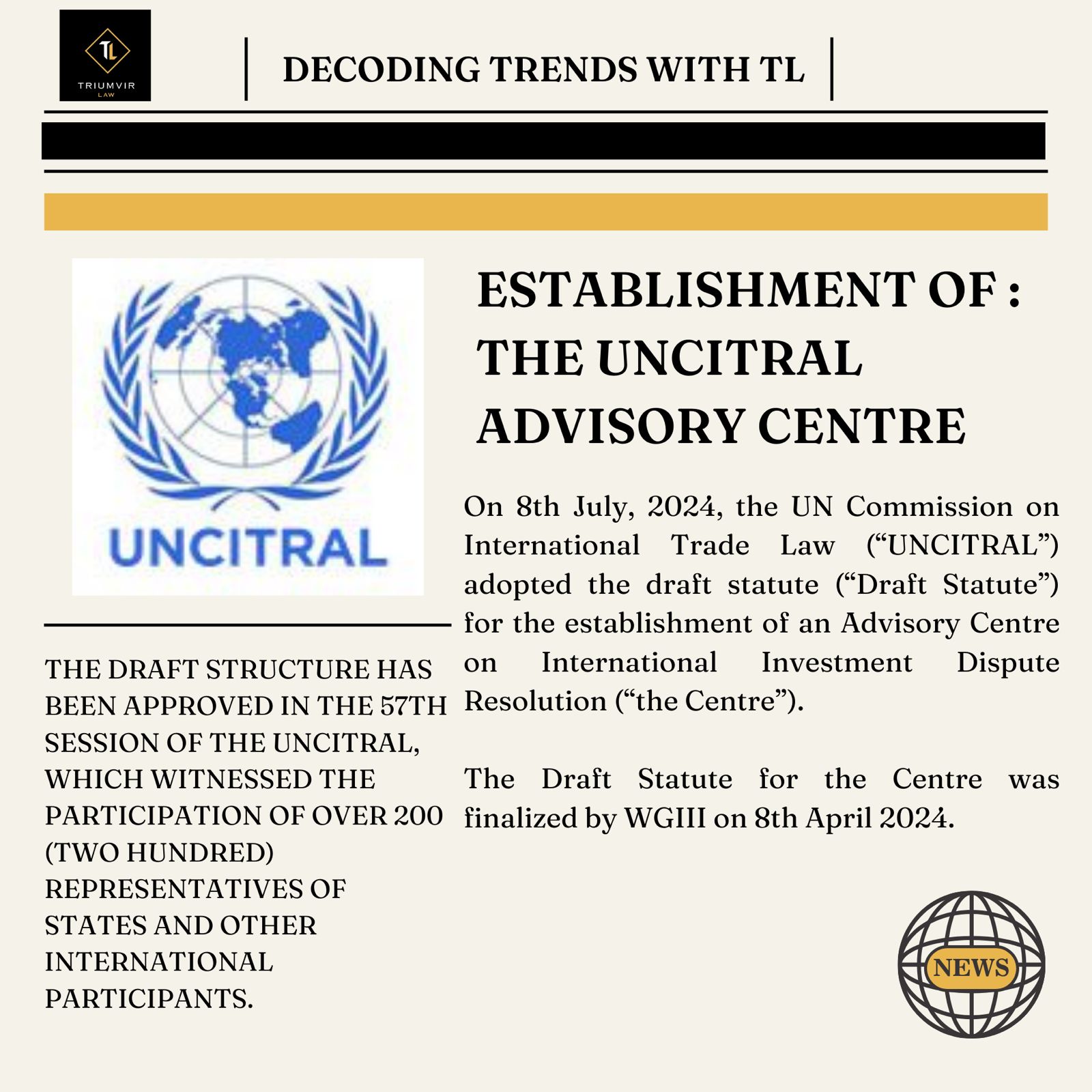
Decoding Trends With Trumvir Law

India Amends The DTAA With Mauritius | Closing The Tax Avoidance Loophole
- June 12, 2024
- Decoding Trends With Triumvir Law
- Aakash Parihar, Jumana Basheer & Aryan Chowdhry
- Introducing DTAA Between India And Mauritius
A Double Taxation Avoidance Agreement (DTAA) is an international treaty signed between two or more countries[1]. The primary purpose of a DTAA is to prevent individuals or businesses from being taxed twice on the same income or capital gains in both their country of residence and the country where the income was earned[2]. While India has executed DTAA’s with nearly 85 countries, this article will specifically focus on the DTAA between India and Mauritius (“India Mauritius DTAA”)[3]. The India Mauritius DTAA was executed on December 06, 1983[4] to promote economic relations. The India Mauritius DTAA has played a significant role in attracting Foreign Portfolio Investments (FPI[5]) in India[6]. It also entails the methods of elimination of double taxation, diplomatic and consular activities and other aspects governing double taxation[7].
2. Amendments to the DTAA
(a) Amendment to the India-Mauritius DTAA (2016)
In due course of time, concerns were raised about the misuse of the India Mauritius DTAA for evasion of tax and round-tripping of funds. In an attempt to resolve these concerns, the India Mauritius DTAA was amended by a protocol dated May 10, 2016[8] (“Amendment”). This Amendment witnessed the introduction of the Limitation of Benefits (LOB) clause which ensured that the benefits of the treaty were only enjoyed by Mauritian residents. A notable amendment proposed in the Amendment was the taxation in India for the sale of shares acquired in Indian companies after April 1, 2017. This shift from a residence-based test to a source-based test for capital gains marked a significant change in the framework of the DTAA. Investments made prior to April 1, 2017, however, were grandfathered[9], to reflect that only the resident country had the exclusive right to tax gains on the alienation of shares. Further, the Amendment allowed India to tax ‘other income’ derived by Mauritian residents, reversing the previous rule where such income was only taxed in the country of residence.
(b)Need To Amend The India-Mauritius DTAA
Mauritius was a preferred jurisdiction for investments until the Amendment in 2016, due to the non-taxability of capital gains from the sale of shares in Indian companies. The Amendment allowed taxation of capital gains from the sale of shares acquired by Mauritian tax residents. The objective of the treaty had also shifted from ‘mutual trade and investment’ to ‘eliminating double taxation’ without creating opportunities for tax evasion or avoidance, including treaty shopping arrangements[10].
(c)Amendment to the India-Mauritius DTAA (2024)
India and Mauritius signed an amendment to their Double Taxation Avoidance Agreement (DTAA) on March 13, 2024 (“2024 Amendment”), sparking concerns among stakeholders. The amendment includes the introduction of a principal purpose test (“PPT”) aimed at preventing tax avoidance by ensuring that treaty benefits are only accessible for legitimate transactions. The preamble of the treaty was also amended to focus on combating tax avoidance and evasion. These amendments are in line with the amendments made in many of the tax treaties through Multilateral Instrument (MLI) pursuant to OECD’s Base Erosion and Profit Shifting (BEPS) project[11] (BEPS MLI). Post the 2024 Amendment, any Indian inbound or outbound cross-border structuring of investment routed through Mauritius should factor in the BEPS MLI.[12]
3. Impact Of The Amendment[13]
The recent 2024 Amendment has introduced the PPT mandate, and this proposed change requires Mauritius based entities to demonstrate that their corporation is legitimate. Such entities are required now to comply with the PPT, in such manner that they will be required to provide evidence that their corporations are fully operational, staffed, rather than just a shell company. The 2024 Amendment has led to concerns that FPI through Mauritius would face increased scrutiny. The amendment has led to concerns that past investments might be re-examined under the new protocol. In the last two decades, the cumulative FDI[14] worth USD 161 billion came from Mauritius to India (26% of total FDI inflows into India) owing to the India Mauritius DTAA. Since the signing of the Amendment in 2016, FDI from Mauritius have ranged from USD 15.72 billion in 2016-2017 to USD 6.13 billion in 2022-2023, with Mauritius becoming India’s third largest source of FDI. The investments made by Indian companies in Mauritius is upwards of USD 200 million in the last five years[15].
The FDI coming from Mauritius is generally routed through companies based in other jurisdictions. If a company routes its funds through Mauritius, it must comply with tax laws in Mauritius and the India Mauritius DTAA. By undertaking such routing, companies benefit from low tax rates in Mauritius. Although the corporate tax rate in Mauritius is 15%, government schemes can reduce the effective tax rate to about 3%. Additionally, there is no withholding tax or capital gains tax on dividend payments. Therefore, it is advantageous for a company to set up a shell company in Mauritius and invest in India.
With the latest DTAA amendment in place, entities with their headquarters in Mauritius will now need to comply with the Principal Purpose Test mandate, which means they will need to provide evidence that the Mauritian corporation is a fully operational, staffed business and not just a shell company. The amendment has led to concerns that foreign portfolio investments through Mauritius would face increased scrutiny.
The Income Tax Department has announced that the amended protocol is yet to be ratified and notified under the section 90 of the Income Tax Act, 1961.
*Disclaimer: This article is for informational purposes only and does not constitute as legal advice or legal opinion. If you require a legal opinion or have specific questions related to the contents of this article, and its impact on your investments or business operations, we recommend that you consult with a qualified tax or legal professional. Please note that the information presented in this article is current as of the date of publication. However, tax laws and regulations are subject to change, and it is essential to stay informed about any updates or further amendments to tax laws.
[1] The primary purposes of a DTAA include (i) Attracting Foreign Investment: By preventing double taxation, a DTAA makes a country a more attractive destination for foreign individuals and businesses to invest, work, and conduct economic activities; (ii) Reducing Tax Evasion: A DTAA establishes specific rules and guidelines for taxation, which helps to reduce instances of tax evasion and ensures compliance with the tax laws of both countries; and (iii) Tax Relief for Non-Residents: A DTAA enables non-resident individuals (NRIs) to obtain relief from paying taxes multiple times on the same income or capital gains in both their country of residence and the source country.
[2] By establishing clear rules and guidelines, a DTAA ensures that taxpayers are not subject to unfair or excessive taxation when conducting cross border economic activities. This also helps to promote international trade, investment and economic co-operation between the signatory countries.
[3] Key Features of India-Mauritius DTAA are detailed below:
Residency Based Taxation: Residents of Mauritius are not taxed in India on income from Indian sources, and vice versa.
Capital Gains Tax: The DTAA exempts or reduces capital gains tax on investments between the two countries. For instance, capital gains from selling shares of an Indian company by a Mauritian resident are taxed only in Mauritius, under specific conditions.
Interest, Royalties, and Fees: Reduced withholding tax rates on interest, royalties, and fees for technical services are provided.
Permanent Establishment: Provisions are included to determine a fixed place of business’s existence for foreign enterprises, affecting their tax liability.
Exchange of Information: The treaty includes provisions for tax authorities of both countries to exchange information, preventing tax evasion and ensuring compliance.
[4] The Amendment aimed to improve transparency in tax matters to help curb tax evasion and tax avoidance. Additionally, the Amendment aims at solving other long pending issues like treaty abuse, revenue loss, double non-taxation – https://www.taxsutra.com/sites/taxsutra.com/files/dtaa/MAURITIUS%20DTAA.pdf
[5] FPI involves the purchase of financial instruments without any direct control or influence over the operations of the company. The investment is typically short-term, with the intention of earning quick returns through the fluctuation in asset prices.
[6] Mauritius is the fourth-largest source of FPI in India, with investments amounting to INR 4.19 crores as of March 2024, accounting for 6% of India’s total FPI. FPI refers to the investment made by foreign entities in the financial assets of another country, such as stocks, bonds, or derivatives. This type of investment is primarily driven by financial gains and short-term returns.
[7] Income Tax Department (incometaxindia.gov.in)
[8] https://dea.gov.in/sites/default/files/protocol_notification_IndoMauritius.pdf
[9] Grandfathering of capital gains in a long-term capital gain account scheme is the exclusion of certain assets from new tax laws or new policies. In simple terms, investments made before the new policy was adopted can be ‘grandfathered’ or excluded from the newly adopted tax policies or rules.
[10] Treaty shopping is a tax avoidance technique that involves using tax treaties and domestic tax laws to gain advantages. It’s also known as “buying into” a double taxation agreement (DTA). The goal is to receive tax benefits by structuring business transactions or investments to take advantage of favourable tax provisions in bilateral tax treaties between countries.
[11] https://www.oecd.org/tax/treaties/multilateral-convention-to-implement-tax-treaty-related-measures-to-prevent-BEPS.pdf
[12] The Protocol (refer to footnote 14) contains three Articles:
Article replacing the existing Preamble of the India-Mauritius tax treaty, the earlier objective of ‘mutual trade and investment’ has now been replaced with an intent to “eliminate double taxation” without creating opportunities for non-taxation or reduced taxation through tax evasion or avoidance including through “treaty shopping arrangements” aimed at obtaining relief provided under this treaty for the indirect benefit of residents of third jurisdictions;
New Article 27B (relating to Entitlement to Benefits), The PPT will deny treaty benefits, such as the reduction of withholding tax on interest royalties and dividends, where it is established that obtaining that treaty benefit is one of the principal purposes for the party engaged in the transaction;
Date of entry into force of the Protocol, i.e., The provisions of the protocol shall have effect from the date of entry into force of the protocol, without regard to the date on which taxes are levied or taxable years to which the taxes relate
[13] This amendment to the Treaty implies that for investments made on or before March 31, 2017, any capital gains realized by Mauritius-based investors from their investments in India through Mauritius can be contested by the Indian Tax Department. The department may argue that the primary purpose of such investments was to obtain tax benefits. Additionally, other Treaty benefits, like reduced tax rates on dividends and interest income, could also be denied based on this reasoning. India and Mauritius shall notify each other upon completion of the procedures required by their respective local laws for bringing the protocol into force. The protocol shall enter into force on the date of later of these notifications.
[14] Foreign Direct Investment (FDI) is a category of cross-border investment in which an investor resident in one economy establishes a lasting interest in and a significant degree of influence over an enterprise resident in another economy.
[15] https://www.mea.gov.in/Portal/ForeignRelation/Mauritius_2023.pdf
RECENT POST
SOCIAL SHARE
Related Post

Budget Takeaways 2024-25
Decoding Trends With Trumvir Law The Budget for FY 2024-2025, presented on July 23, 2024, aims to advance India’s growth

The Transformation of Criminal Law in India: A Comprehensive Overview
Decoding Trends With Trumvir Law India’s legal landscape witnessed a seismic shift on July 1, 2024, with the introduction of

Empowering Arbitration: The Advisory Centre on International Dispute Resolution
Decoding Trends With Trumvir Law I. Introduction On 8th July, 2024, the UN Commission on International Trade Law (“UNCITRAL”) adopted

